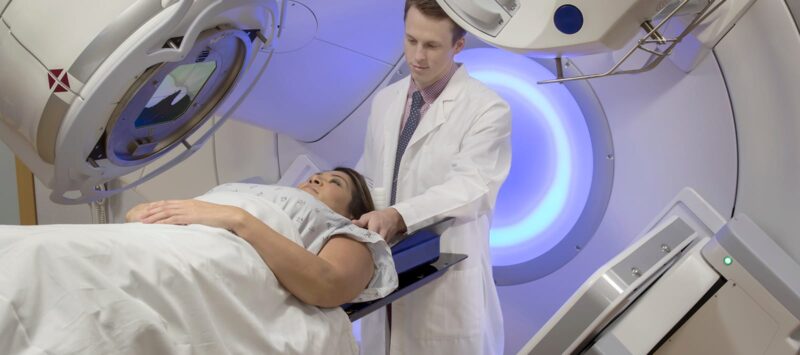
Understanding the Role of Radiation Therapists
Radiation therapists are highly skilled healthcare professionals who are essential to radiation oncology. They specialize in delivering precise radiation treatments to patients, predominantly those battling cancer. Working as key oncology team members alongside radiation oncologists and nurses, their primary role is to accurately administer radiation to the target and reduce or eliminate cancerous cells within the body.
Who Are Radiation Therapists ( RTTs)?
Radiation Therapists are highly skilled healthcare professionals who are central to the delivery of radiation therapy, a vital cancer treatment. Operating under the guidance of radiation oncologists, they are key members of the multidisciplinary oncology team, collaborating closely with nurses, medical physicists, and dosimetrists. Their primary responsibility involves meticulously administering prescribed radiation treatments to patients, utilizing advanced machinery like linear accelerators and proton therapy units, to target and reduce or eradicate cancerous cells precisely.
Beyond their technical expertise in operating complex equipment and ensuring treatment accuracy, radiation therapists provide crucial emotional support and clear explanations to patients throughout their often challenging treatment journey. They combine a firm grasp of technology with essential interpersonal skills to ensure the efficacy and comfort of patient care.
What Are The Core Activities Of Radiation Therapists (RTTs)?
Radiation therapists engage in a detailed and technically demanding set of core activities, all centered around the precise and safe delivery of radiation treatments to patients, primarily those with cancer. Their primary duties encompass executing treatment plans, ensuring patient and equipment safety, and providing vital patient support.
A fundamental activity for radiation therapists is executing treatment plans prescribed by radiation oncologists. This involves administering radiation therapy using sophisticated machines like linear accelerators or proton therapy units. They are responsible for meticulously positioning patients for each treatment session. They often utilize custom-made immobilization devices and advanced imaging technology (such as on-board CT scans or X-rays) performed directly on the treatment machine. This precise setup ensures the radiation beam accurately targets the intended area, whether a tumor or another diseased site.
Another crucial aspect of their role involves ensuring patient and equipment safety. Radiation therapists continually monitor patients for any unusual reactions during treatment, ready to relay information to the oncology team if needed. They are also responsible for maintaining and calibrating radiation machines, conducting regular checks to confirm proper functioning and accuracy. This vigilance helps prevent dosage or delivery errors and protects patients and staff from unnecessary radiation exposure. They meticulously follow strict safety protocols, often operating equipment remotely from behind protective screens.
Furthermore, radiation therapists are deeply involved in patient care and support. They frequently consult with patients, explaining treatment procedures, discussing potential side effects, and addressing concerns. Given that patients often undergo daily treatments for several weeks, therapists build strong relationships, offering emotional support and acting as a crucial link between the patient and the wider oncology team. They also maintain detailed treatment records, documenting every aspect of the session for accurate tracking and continuity of care. This comprehensive approach ensures that the complex process of radiation therapy is delivered with both technical excellence and compassionate support.

Source Northwestern Health Sciences University
Education and Training of Radiation Therapists(RTTs)
To become a radiation therapist, individuals must complete a specialized educational pathway and secure proper certification.
The initial step typically involves obtaining a higher education degree in radiation therapy. Prospective therapists can pursue either a two-year associate’s degree or a four-year bachelor’s degree. These programs are designed to provide a comprehensive foundation, encompassing both classroom learning and crucial hands-on clinical training. The clinical component is vital, allowing students to gain practical experience working directly with patients and operating complex radiation treatment equipment in a supervised setting.
Following the completion of their degree program, aspiring radiation therapists generally must undergo a certification process. In the United States, this is commonly achieved by passing a national certification examination administered by the American Registry of Radiologic Technologists (ARRT). This certification confirms that the individual meets stringent standards of knowledge and skill across various critical areas, including radiation safety, patient care protocols, and the practical delivery of treatments. It also demonstrates their understanding of advanced oncology methods, as required for ARRT credentials. While the exam itself takes one day, preparation may span weeks or months, and candidates must typically complete it within three years of earning their degree.
Furthermore, certification usually requires annual renewal, and therapists must engage in continuing education to maintain their professional standing and stay current with evolving practices. Depending on the state where they intend to practice, radiation therapists may also need to secure a state license to become a registered technologist, as requirements can vary. This multi-faceted educational and certification journey ensures that radiation therapists are thoroughly prepared to handle the intricate responsibilities of their role, blending technical expertise with a commitment to patient safety and well-being.

Read OncoDaily’s Speical Article About Medical Physicists
Radiation Therapists in Research
Radiation therapists also play a important role in advancing the field through their direct involvement in research. Leveraging their daily, hands-on experience with patients and equipment, they offer invaluable insights that enhance treatment delivery and the overall patient experience. Their research efforts frequently concentrate on optimizing daily clinical practices, such as validating new techniques for patient positioning and imaging guidance to boost accuracy. Additionally, they contribute to studies aimed at improving patient comfort, managing treatment side effects, and better integrating new technologies into clinical workflows, ensuring that advancements translate effectively into practical, beneficial care.
Written By Aren Karapetyan, MD
-
Challenging the Status Quo in Colorectal Cancer 2024
December 6-8, 2024
-
ESMO 2024 Congress
September 13-17, 2024
-
ASCO Annual Meeting
May 30 - June 4, 2024
-
Yvonne Award 2024
May 31, 2024
-
OncoThon 2024, Online
Feb. 15, 2024
-
Global Summit on War & Cancer 2023, Online
Dec. 14-16, 2023
